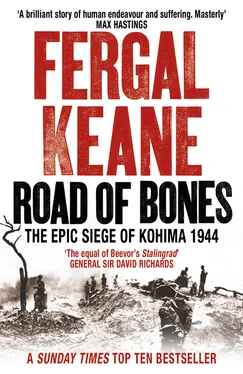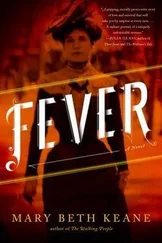There was a growing feeling among company commanders like John Winstanley and Donald Easten that the exercises were exposing the inadequacy of their commanding officer. After talking it over, the younger officers went in a delegation to see Lieutenant Colonel Saville. Donald Easten described what happened next. ‘We went to see him and each of us told him in turn that we had no absolutely no confidence in him. So he turned to us and said: “Do you realise this is mutiny?” And we said: “It might be, we don’t know. But we have no confidence in you, in putting the lives of our men in your hands in action in Burma.”’ The 4th West Kents were by now part of 161 Brigade, whose commander was the avuncular, if occasionally fiery, Brigadier Frederick ‘Daddy’ Warren. As the senior officer among the group John Winstanley was nominated to take the matter to Warren. ‘He gave me absolute stick … for this mutiny really … to go and say that you are not going to go and work under this man! … and I was sent packing, and the man was removed because as the brigadier said, “Well, you’ve made it impossible for him to command anyhow.”’ Lieutenant Colonel Saville was sent to a staff appointment in Delhi. The man who replaced him would make a profound mark on the 4th West Kents and the whole story of Kohima: he could inspire devotion among his men and the contempt of those he crossed, and he would carry the 4th West Kents through their darkest days.
He did not at first sight cut an intimidating figure. The new CO was about five foot nine and not heavily built. But Lieutenant Colonel John Laverty had a presence that could cow the toughest of the battalion’s hard men. He was forty-four when he came to lead 4th battalion, still a comparatively young man but nearly two decades older than most of those under his command. Laverty was variously known as ‘Texas Dan’, because of the cowboy-style military hat he wore, or ‘Colonel Lavatory’, the latter nickname apparently derived from a rugby song the precise lyrics of which have been lost to history. Neither men nor officers ever dared to use the nicknames to his face. Laverty carried a long bamboo rod to use as a climbing stick; it could also give him the appearance of a prophet descending from the heavens with the judgement of God.
John Laverty did not tolerate muttering from his officers. When Lieutenant Tom Hogg went to him to complain about problems created by a soldier in his platoon, Laverty immediately asked him which rifle company he wanted to join. ‘By those who understood the situation this amounted to a “slap across the face” for me,’ recalled Hogg. ‘In fact, that aspect of it went completely over my head at the time, and I enjoyed the prospect of doing some real fighting.’
One of the battalion medical orderlies, Lance Corporal Frank Infanti, gave a different picture of Laverty. Infanti had a troubled history with the battalion. Both his parents were Italian and this had led to his brother being interned in the opening months of the war, ironically while Frank himself was being evacuated with the West Kents from Dunkirk. When he was refused permission to visit his brother in the internment camp Infanti said he would no longer carry a rifle. In a moment of compassion the then CO decided against disciplinary action and made Infanti a medical orderly. ‘I got on extremely well with Laverty because I’m a little fella. I would never have got in the army normally because I’m too short. And he sort of respected me because I kept up with everybody! On the marches and all that. He was an unusual bloke, Laverty. He used to call me “Doc” Infanti which was a great compliment to an orderly … he spoke in a very cultivated voice … almost as if he had had elocution lessons.’
John Laverty was born Henry Jarvis Laverty in Londonderry on 8 October 1900 to a prominent family in the building trade. His father Henry built the Protestant cathedral of St Anne’s in Belfast and had a large brickyard in Carrickfergus, which one employee reckoned had ‘made the mortar for half the houses in Carrick in those days’. He went to school at Foyle College, which numbered a Lord Chancellor of Ireland, numerous rugby internationals and a Viceroy of India among its alumni. A month before the end of the First World War, John Laverty applied to Sandhurst, from where he was commissioned into the Royal Inniskilling Fusiliers in 1921. These were bad years in his home country. Ireland was convulsed by war between the IRA and the forces of the crown. As a member of a prominent Protestant family who had decided to join the British army, it is safe to surmise that John Laverty would have had little sympathy with Irish rebels.
What Laverty retained of that Ulster Protestant upbringing was the flinty outward manner of a man raised among righteous but unyielding citizens. His son Patrick, who saw his father only once during the war, thought him a soldier to the core. ‘Pure and simple he was a warrior. That is what he was good at … He was pretty tough. They called him bloody-minded and I think he probably was. You didn’t get anywhere. I mean once he made up his mind he couldn’t be varied at all. He was absolutely pig-headed in that regard.’
After three years in the Inniskilling Fusiliers, Laverty joined the Essex Regiment, where his index card referred to him as ‘Mad Jack’, possibly a reflection of the bloody-minded personality described by his son and some of his junior officers. His war-fighting experience was gained in the small colonial police actions of the inter-war period, firstly in Kurdistan and later in Sudan. He was awarded a Military Cross during the suppression of the Kurds in 1932 and was later promoted to be Inspector of Signals for the British-controlled Iraqi army. By the time the Second World War broke out John Laverty was back with the Essex Regiment, with the rank of major, and had married Renee Stagg, a doctor’s daughter from Southend, whom he had met while playing golf. Within a few months of their wedding she was pregnant with the first of three children. On the outbreak of war Laverty was posted to the East End of London on ‘anti-panic’ duty, while Renee and her baby were sent to Shropshire to escape the Blitz. ‘There was a big parting of the ways. Everybody was going through those kind of separations,’ Renee recalled. John Laverty was eventually posted to serve with the Essex Regiment in India in 1942. By the following year he had been promoted from major to the temporary rank of lieutenant colonel and sent to lead 4th battalion, Queen’s Own Royal West Kent Regiment, into battle.
Captain Donald Easten remembered his arrival. ‘I thought to myself, “Thank God, at last we have someone who knows what he is talking about.” He was not the kind of person you would say, “I would do anything for this chap,” but at least he was competent. You knew his decisions would be properly thought out. I didn’t love him. I don’t think any of us did. We respected him.’ Respect would have been enough for John Laverty.
The men were coming to the end of their training period and could properly call themselves ‘jungle wallahs’. Ray Street was one of the smaller men in the battalion and weighed only eight and a half stone, but he was quick on his feet and brave, ideal material for a battlefield messenger who would have to run quickly between positions under fire. He had started the war as a soldier in the Worcester Regiment but after undergoing his jungle training in India was sent off to 4th battalion to help bring them up to full strength for the fighting ahead. Street had not seen combat yet, but had heard his father’s stories of the fighting at Gallipoli and the throat wound that had nearly ended his life. His experience of war on the home front had been eventful. Having enlisted first into the Home Guard, Street was allocated to Birmingham city centre and found himself there during a German bombing raid. A stick of bombs hit the street next to where he was standing. Running to the scene he saw that a cinema had been hit and the street was full of screaming, wounded people. He rushed inside to help evacuate the survivors. A woman sat with her arms folded serenely in the seat where she had been watching the film. But her head had been sliced cleanly off by a piece of flying metal.
Читать дальше












